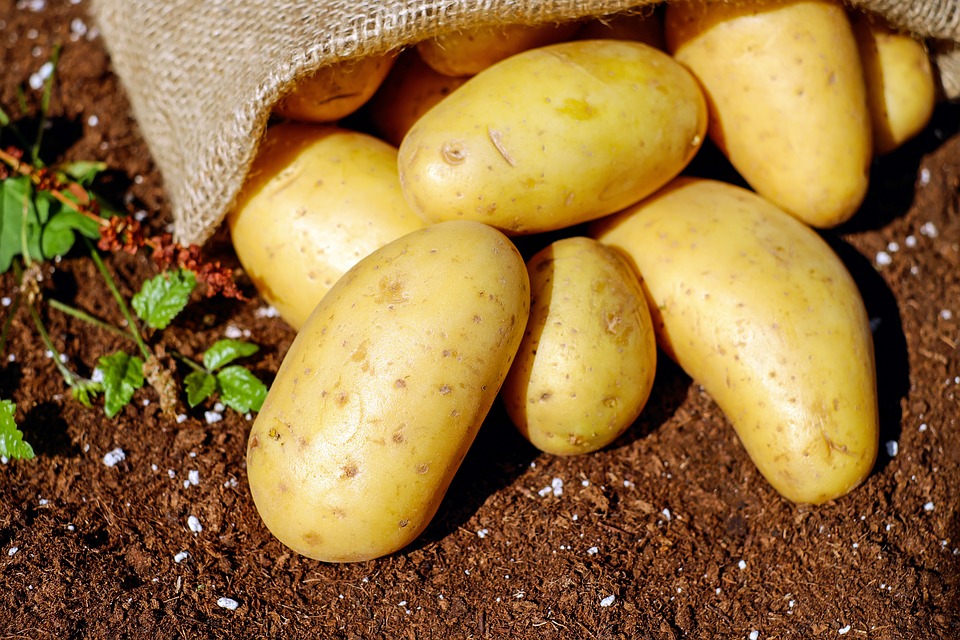Highest Calorie Beans: A Comparison Of Bean Types
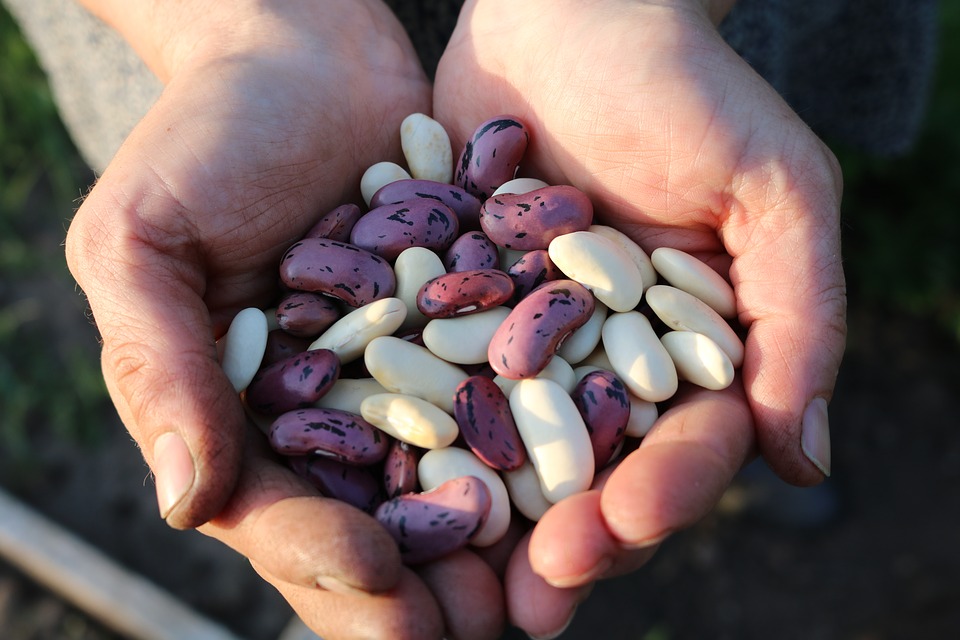

Beans are wonderful. They’re a healthy, filling, plant-based food that usually contains a lot of protein. Adding more beans to your diet is a great idea. But different types of beans have different nutritional values. This is a list of the highest calorie beans. If you are attempting to gain weight/muscle, these beans are going to help you along the way. If you want to loose weight, maybe avoid these high calorie beans.
Bean Nutrients
Beans are a great source of Folate, Phosphorus and Manganese. They have many other nutrients and are definitely a good food. Because they tend to be filling and high in protein they are especially important in vegetarian diets.
Folate, also known as vitamin B9, is essential for several important bodily functions. It plays a crucial role in DNA synthesis and repair, making it vital for cell division and growth. Folate is particularly important during pregnancy as it helps prevent neural tube defects in developing fetuses. Additionally, it supports the production of red blood cells and aids in converting food into energy.
Phosphorus is a mineral that plays a fundamental role in maintaining strong bones and teeth, as about 85% of the body’s phosphorus is found in bones. It is also a critical component of DNA, RNA, and ATP, which are involved in various cellular processes, including energy production, and cellular communication. Phosphorus is crucial for overall growth, repair, and maintenance of body tissues.
Manganese is an essential trace mineral that acts as a cofactor for a range of enzymes involved in various metabolic processes. It plays a role in bone formation, blood clotting, and the metabolism of amino acids, cholesterol, and carbohydrates. Manganese is also an antioxidant, helping to protect cells from oxidative damage. It contributes to overall health by supporting these vital biochemical reactions in the body.
Soy Beans — 296 Calories
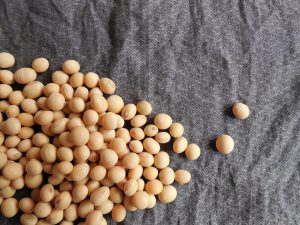
Soy beans are what tofu and many imitation meat products are made from. They provide a very large amount of protein and have many uses. Their uses include soy milk and tempeh, as well being used as a source of animal feed.
Soybeans are highly nutritious legumes packed with essential nutrients. They are an excellent source of complete protein, making them a valuable plant-based protein option. Soybeans are rich in fiber, aiding digestion and promoting a feeling of fullness. They provide healthy fats, primarily unsaturated fats, which are beneficial for heart health. Additionally, soybeans contain vitamins like folate and B vitamins, along with minerals such as iron, calcium, and magnesium. Moreover, they are known for their phytochemicals, like isoflavones, which have potential health benefits. Overall, soybeans offer a well-rounded nutritional profile that supports various aspects of a healthy diet.
A cup of boiled soy beans contains 296 calories, 10.3g of fiber and 31.3g of protein.
Adzuki Beans — 294 Calories
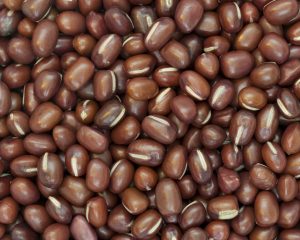
Adzuki beans, also known as red beans, are a nutritious legume commonly used in Asian cuisine. They are a rich source of protein, providing essential amino acids for muscle and tissue repair. Adzuki beans are low in fat and cholesterol, making them heart-healthy, and they contain dietary fiber that aids digestion and promotes a feeling of fullness. These beans are also packed with essential minerals like iron, potassium, and magnesium, supporting various bodily functions. Additionally, adzuki beans are a good source of folate and other B vitamins, contributing to overall energy metabolism and cellular health. Their combination of protein, fiber, and essential nutrients makes adzuki beans a valuable addition to a balanced diet.
A cup of boiled azuki beans contains 294 calories, 16.8g of fiber and 17.3g of protein.
Garbanzo Beans — 269 Calories
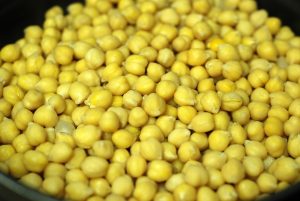
Garbanzo beans, also called chickpeas, are used to make hummus, curries, dhokla and other foods. They are popular in the Mediterranean, India, and other parts of the world. They are an excellent source of plant-based protein, providing a substantial amount of amino acids, making them a valuable part of a vegetarian or vegan diet. Additionally, garbanzo beans are rich in dietary fiber, which supports digestive health and helps regulate blood sugar levels. They contain a variety of essential vitamins and minerals, including folate, manganese, and iron. Moreover, garbanzo beans are known for their versatility in cooking, serving as a key ingredient in dishes like hummus and falafel, making them a versatile and nutritious addition to a balanced diet.
A cup of boiled garbanzo beans contains 269 calories, 12.5g of fiber and 14.5g of protein.
Baked Beans (No Sauce) — 266 Calories
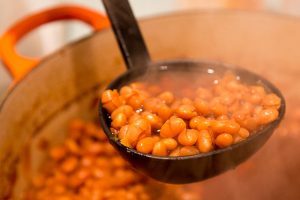
Baked beans are a nutritious and popular dish made from cooked beans, typically navy beans, in a savory tomato or molasses-based sauce. Though the beans themselves have about 266 calories, the sauce they are served in adds a significant amount of calories. They are a good source of plant-based protein and fiber, which can help promote feelings of fullness and aid in digestive health. Baked beans also contain essential vitamins and minerals, such as iron, potassium, and folate. The tomato sauce provides a dose of vitamin C and antioxidants. However, it’s important to note that some varieties of baked beans may be high in added sugars and sodium, so choosing low-sugar or reduced-sodium options can make them a healthier addition to your diet.
A cup of canned baked beans contains 266 calories, 13.9g of fiber and 12.1g of protein.
Navy Beans — 255 Calories
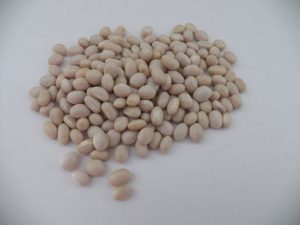
Sometimes called Boston beans or white beans, navy beans were a staple in American military meals in the 19th century. They contain the largest concentration of phosphatidylserine of any plant-based food. They are an excellent source of plant-based protein, offering ample amounts of fiber, essential for digestive health and maintaining steady blood sugar levels. Navy beans are rich in folate, which is important for cell division and pregnant women’s prenatal care. These beans are also loaded with minerals like manganese, phosphorus, and iron, contributing to bone health, energy production, and oxygen transport in the body. In addition, navy beans provide antioxidants that help combat oxidative stress and support overall well-being. Incorporating navy beans into your diet can be a wise choice for promoting nutritional balance and health.
A cup of boiled navy beans contains 255 calories, 19.1g of fiber and 15g of protein.
Pinto Beans — 245 Calories
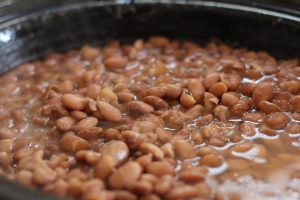
Pinto beans are common in burritos and other Mexican food. They are also used to create common types of refried beans. These are the most popular beans in the United States. They are rich in protein, making them an excellent plant-based protein source, while also providing essential nutrients such as fiber, folate, iron, and magnesium. Pinto beans offer a balanced combination of carbohydrates and protein, which can help stabilize blood sugar levels and promote satiety. Additionally, they are low in fat and contain no cholesterol, making them a heart-healthy choice. These beans are also a good source of antioxidants and may contribute to better overall health by supporting digestive health and reducing the risk of chronic diseases.
A cup of boiled pinto beans contains 245 calories, 15.4g of fiber and 15.4g of protein.
Cranberry Beans — 241 Calories
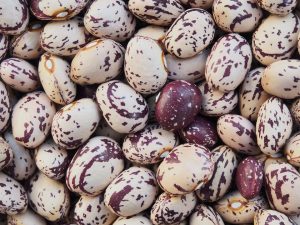
Cranberry beans are medium ran beans streaked with red or pink. Imagine if someone sprayed a white bean with cranberry juice, that’s what they look like. They are also called Roman beans or borlotti beans These beans are a good source of protein, offering plant-based protein that is essential for muscle maintenance and growth. They are rich in dietary fiber, aiding digestion and promoting a feeling of fullness. Cranberry beans also provide a variety of essential minerals, including iron, magnesium, and potassium, which support overall health and well-being. Moreover, they are a good source of folate, a B-vitamin crucial for various bodily functions. Additionally, cranberry beans contain antioxidants like flavonoids and phenolic compounds, which can help combat oxidative stress and inflammation, contributing to a balanced diet and potentially reducing the risk of chronic diseases.
A cup of boiled cranberry beans contains 241 calories, 15.2g of fiber and 16.5g of protein.
Split Pea — 231 Calories
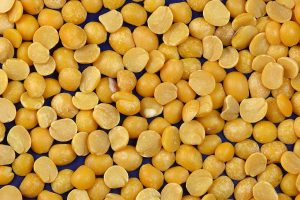
Split peas are a type of bean. A pea is actually just a round shaped bean. In the United States, split peas are most commonly used to make split pea soup. They are a rich source of dietary fiber, offering significant digestive benefits and aiding in weight management. Additionally, split peas are packed with protein, making them an excellent plant-based protein source for vegetarians and vegans. They are low in fat and provide essential vitamins and minerals, including folate, manganese, and phosphorus. Split peas are particularly noteworthy for their high iron content, contributing to overall blood health. Moreover, they offer a valuable mix of antioxidants, such as flavonoids, which help combat oxidative stress and inflammation in the body. Incorporating split peas into your diet can be a wholesome way to enhance your nutrition and support overall well-being.
A cup of boiled split peas contains 231 calories, 16.3g of fiber and 16.3g of protein.
Lentils — 230 Calories
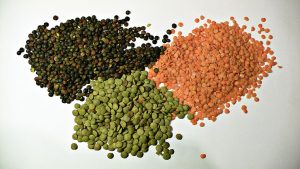
Lentils are a legume used in dishes throughout the world; from lentil soups to lentil rice and raisin dishes. Dried lentils can be found is most supermarkets. They are rich in protein, making them an excellent plant-based protein source, particularly for vegetarians and vegans. Lentils are also packed with dietary fiber, which aids in digestion and helps maintain stable blood sugar levels. They are a good source of essential minerals like iron, magnesium, and potassium, contributing to overall health and well-being. Lentils are low in fat and contain no cholesterol, making them heart-healthy. Additionally, they provide essential vitamins such as folate, thiamin, and vitamin B6. With their balanced nutritional profile, lentils are a nutritious addition to a diverse range of dishes and diets.
A cup of boiled lentils contains 230 calories, 15.6g of fiber and 17.9g of protein.
Green Beans — 228 Calories

Also known as French beans, string beans, or snap beans. These are different from many other bean types because they are harvested, sold and eaten with their enclosing pods still attached. These beans are harvested before they become ripe. They are low in calories and provide essential vitamins and minerals. Green beans are a good source of fiber, which aids in digestion and helps maintain a feeling of fullness. They are rich in vitamin C, an antioxidant that supports the immune system and skin health, as well as vitamin K, which plays a role in blood clotting and bone health. Green beans also contain folate, a B-vitamin important for DNA synthesis and cell growth, along with minerals like potassium and manganese. Additionally, they are free from cholesterol and saturated fats, making them a healthy addition to a balanced diet.
A cup of boiled green beans contains 228 calories, 16.6g of fiber and 12.5g of protein.
Black Beans — 227 Calories
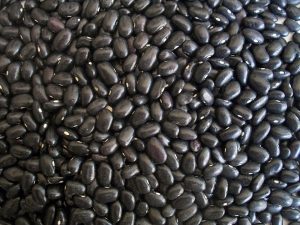
Black beans are a commonly used in Latin America food. They are sometimes called black turtle beans. They are dense and meaty. They are a notable source of plant-based protein, providing both essential amino acids and fiber, making them beneficial for maintaining muscle health and aiding in digestion. Additionally, black beans are rich in complex carbohydrates, particularly dietary fiber, which supports stable blood sugar levels and promotes a feeling of fullness. These beans are also packed with essential minerals like iron, magnesium, and potassium, contributing to overall health and cardiovascular function. Furthermore, they are a low-fat food and contain no cholesterol, making them a heart-healthy choice. Black beans are a versatile and nutritious addition to a balanced diet, offering numerous health benefits.
A cup of boiled black beans contains 227 calories, 15g of fiber and 15.2g of protein.
Most Nutritious Type Of Bean
Most beans, regardless of their variety, share similar nutritional benefits, making them a valuable staple in a balanced diet. These legumes are renowned for their high protein content, providing an excellent source of plant-based protein that is essential for muscle repair and growth. Additionally, beans are rich in dietary fiber, both soluble and insoluble, which aids in digestive health by promoting regular bowel movements, preventing constipation, and helping to maintain stable blood sugar levels.
Beans are also a low-fat food choice and are naturally free of cholesterol, making them heart-healthy options. They are abundant in complex carbohydrates, providing a steady source of energy, and are often considered a low glycemic index food, which helps regulate blood glucose levels.
Furthermore, beans are packed with essential vitamins and minerals such as folate, iron, magnesium, and potassium. These nutrients support various bodily functions, including the formation of red blood cells, bone health, muscle contractions, and electrolyte balance. Additionally, beans are rich in antioxidants, which help protect cells from oxidative stress and contribute to overall well-being.
I highly recommend everyone include more beans in their diet. Adding beans to your diet might be one of the best way to improve your diet. Don’t worry too much about how many calories there are in different types of beans. Because they are high in fiber it will be hard to over-eat a meal that is based on beans.
In conclusion, the nutritional benefits of beans are fairly consistent across different varieties, making them an excellent choice for those seeking a healthful diet. Whether it’s black beans, kidney beans, pinto beans, or any other type, incorporating beans into your meals can provide a wide array of essential nutrients, making them a versatile and nutritious addition to a well-rounded eating plan.


